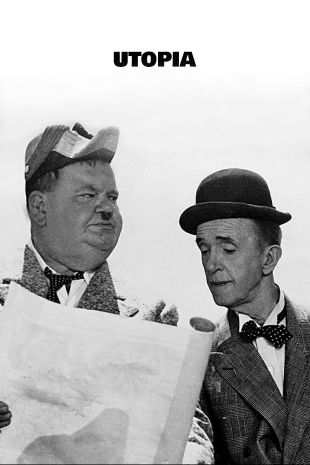Considering that it was the result of a French/Italian co-production in which the directors (at least two of them, one American), crew, and cast mostly needed interpreters to communicate with each other, a screenplay that was the work of at least five people, and also some very shaky financing and distribution, Atoll K is not the disaster that someone knowing all of that might have anticipated. That's the plus side -- it's a comedy that touches upon the condition of the world and where it seemed to be heading circa 1950, and offers quite a few laughs along the way, mostly of the slapstick variety but also rooted in political satire. On the other hand, as a Laurel & Hardy vehicle, and the final Laurel & Hardy vehicle at that, it's a disappointing coda to a catalog that is otherwise mostly filled with concisely edited, carefully devised shorts and features (albeit most of them from the Hal Roach era). But taken on its own terms, Atoll K (aka Utopia aka Robinson Crusoeland) is a surprisingly ambitious comedy -- perhaps too ambitious. One can tell very quickly that the plot is loaded with serious implications amid its comedy -- Stan and Ollie try to take possession of Stan's inheritance and discover that most of it has gone to taxes and legal fees; only an island and a broken down old tub of a boat remain, and the pair quickly acquire the company of two people just as displaced as they feel, a "stateless" man (Max Elloy) who becomes their cook, and, initially as a stowaway, a discontented bricklayer (Adriano Rimaldi) who wants something more than what life has given him up to now. And they're later joined by Cherie Lamour (Suzy Delair), the runaway fiance of a naval officer -- who also wants more out of life than his domineering presence seems to offer. And all of that is a great set-up for some piercing social commentary as well as comedy, which seems to be what the writers and the makers had in mind. The movie is permeated with the issues that were facing the post-war world, as empires receded, the forces of order spent themselves, and new forces of disorder rose in our midst: Displaced persons, national (and personal) aspirations unleashed, hunger still rampant, and fear of other nations still a dominant feature on the world landscape. The fact that nobody other than the five people who found it -- who try to live a peaceful, idyllic life -- cares about Atoll K except as a place to mine uranium (for weapons) or as a haven from laws, for the worst impulses borne of Europe's chaos says a great deal about the thinking of the people behind the picture. Ironically, American director John Berry, who was brought in to augment the work of original director Leo Joannon, was, himself, a blacklistee for his leftist views -- but his involvement began subsequent to the script's completion, and the movie takes an even hand, criticizing by implication all of the nuclear and would-be nuclear powers (east and west) of the era for their lack of concern with people. And therein lay part of the problem. People paying to see a Laurel & Hardy movie probably weren't expecting a movie that carried so much weight in between its laughs, however deftly and comically it dealt with some of these subjects; or, incidentally, to see Stan Laurel, in particular, looking as dire as he does in some scenes here. The latter couldn't be helped, as the legendary performer was seriously ill during shooting -- but the messages and questions that are woven throughout Atoll K were probably more appropriate to a later Chaplin movie (such as Modern Times, The Great Dictator, Monsieur Verdoux, or, especially, A King In New York than to L&H's output. Their contribution is very funny -- and, thankfully, a bit lighter -- than most of the script, and one heartily wishes the various elements could have been woven together better. But then, that raises another question. According to various accounts, Atoll K ran nearly 100 minutes in Italy under that title, and 92 minutes in France under the same title, and only 82 minutes in England (as Robinson Crusoeland) and America (as Utopia, which didn't open in the US until 1954). It might be fascinating, as well as worthwhile, to try and track down the 92 minute or 98 minute versions and see if either holds together better. As it is, the familiar 82 minute version is a tantalizing -- if sometimes frustrating -- glimpse of a kind of movie that the duo otherwise never did approach. One other frustration for modern viewers, alas, is the movie's "public domain" status in the United States, which makes it virtually impossible to see good looking editions of even the shorter version of the movie -- the best that has been seen in recent years is probably the one prepared by the Hal Roach Studio for its syndicated "Laurel And Hardy" weekly television program in the 1980s, seen most recently on ME-TV.

Utopia (1951)
Directed by John Berry / Léo Joannon
Genres - Comedy, Action, Adventure, Family & Personal Relationships |
Sub-Genres - Adventure Comedy |
Release Date - Dec 14, 1954 (USA) |
Run Time - 80 min. |
Countries - France, Italy |
MPAA Rating - NR
Share on